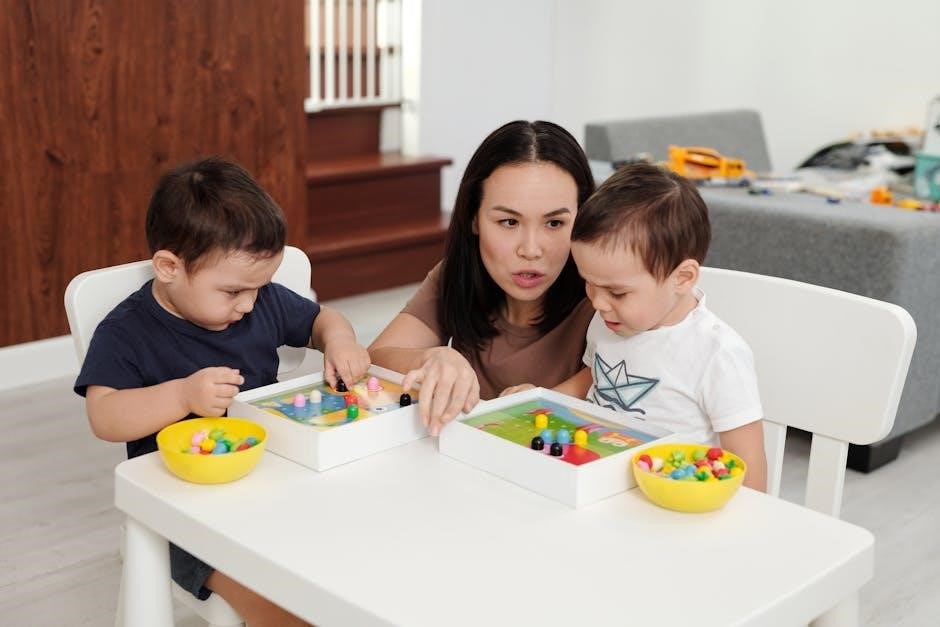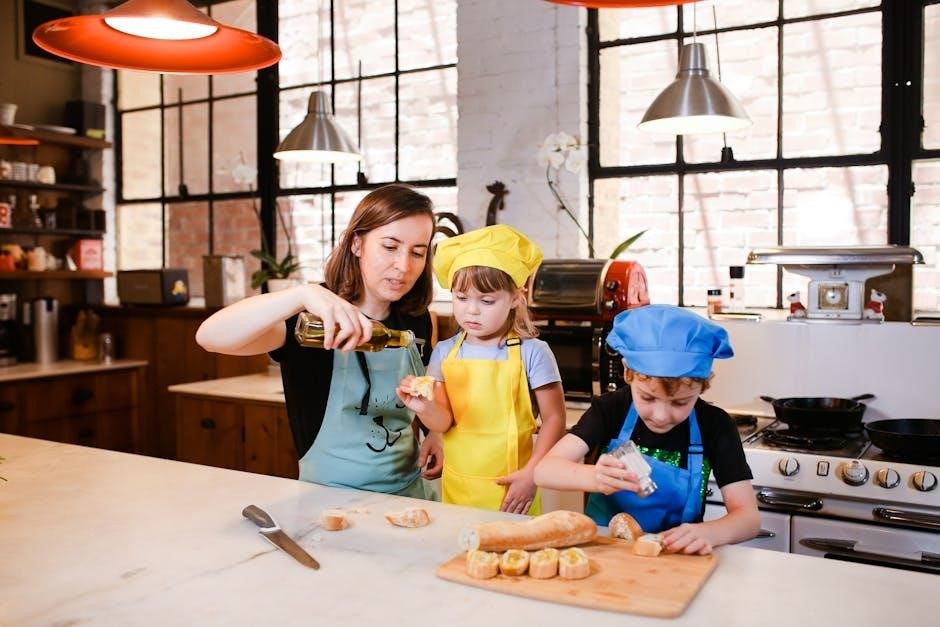happiness: a guide to developing life’s most important skill
Discover the secrets to lasting happiness. Learn how to cultivate joy and positivity in your daily life with our expert guide.
Happiness is a skill that can be cultivated through practice and mindset, as emphasized by Matthieu Ricard, often called the “world’s happiest man․”
1․1 The Concept of Happiness as a Life Skill
Happiness is increasingly recognized as a skill that can be learned and refined, much like mastering a musical instrument or a sport․ Matthieu Ricard, often referred to as the “world’s happiest man,” emphasizes that happiness is not merely a fleeting emotion but a state cultivated through practice․ Rooted in mindfulness, gratitude, and compassion, this skill empowers individuals to navigate life’s challenges with resilience․ By understanding happiness as a skill, we can actively work toward fostering it, leading to a more fulfilling and purposeful life․ Daily effort and intention are key to its development․
1․2 Why Happiness is Essential in Modern Life
In today’s fast-paced, stress-filled world, happiness has become a vital skill for maintaining well-being․ Matthieu Ricard and Yale’s Happiness Lab highlight its importance in fostering resilience, improving relationships, and enhancing productivity․ By prioritizing happiness, individuals can better navigate modern pressures, such as financial stress and social expectations․ Cultivating happiness not only improves mental health but also creates a foundation for living a fulfilling life, making it indispensable in contemporary society․ Its benefits extend to personal growth, stronger connections, and overall life satisfaction, making it a cornerstone of modern living․

Understanding the Science of Happiness
The science of happiness explores how neuroscience and psychology shape our well-being, revealing that happiness is a skill developed through practice and specific techniques․
2․1 The Role of Neuroscience in Happiness
Neuroscience reveals that happiness is deeply rooted in brain function, with practices like meditation altering neural pathways to foster joy․ Matthieu Ricard’s work highlights how neuroplasticity enables us to rewire our brains for well-being, emphasizing that happiness is a skill, not a fixed trait․ By training the mind, we can enhance positive emotions and resilience, showing that lasting happiness is achievable through conscious effort and understanding of our brain’s potential․
2․2 Psychological Principles of Well-Being
Psychological principles of well-being emphasize the importance of mental habits like gratitude, mindfulness, and positive relationships․ Matthieu Ricard, a scientist turned Buddhist monk, highlights that happiness stems from training the mind to focus on what truly matters․ Yale’s Happiness Lab, led by Dr․ Laurie Santos, further supports this by showing how intentional practices can reshape mental frameworks․ By cultivating these psychological strategies, individuals can build a foundation for lasting well-being and life satisfaction, aligning with the idea that happiness is a skill to be developed over time․

Key Components of Developing Happiness
Developing happiness involves cultivating mindfulness, gratitude, and strong social connections․ Matthieu Ricard and Yale’s Happiness Lab emphasize these practices as foundational for lasting well-being and life satisfaction․
3․1 Mindfulness and Presence
Mindfulness and presence are cornerstone practices for cultivating happiness․ By focusing on the present moment, individuals can appreciate life’s beauty and reduce worries about the past or future․ Matthieu Ricard, a Buddhist monk, highlights mindfulness as a key component in developing inner peace․ Regular mindfulness practices, such as meditation, help train the mind to embrace joy and let go of negativity․ Dr․ Laurie Santos from Yale’s Happiness Lab also emphasizes the importance of being present in daily activities to enhance overall well-being and satisfaction․
3․2 Cultivating Gratitude
Cultivating gratitude is a powerful tool for enhancing happiness; Matthieu Ricard emphasizes that focusing on what we already have, rather than what we lack, fosters contentment․ Dr․ Laurie Santos from Yale’s Happiness Lab suggests that practicing gratitude rewires the brain to notice life’s positives․ Simple practices like journaling daily blessings or sharing appreciation with others can significantly boost well-being․ Gratitude shifts our mindset from scarcity to abundance, helping us value life’s small joys and build a more fulfilling existence․
3․3 Building Strong Social Connections
Strong social connections are vital for happiness, as they provide emotional support and a sense of belonging․ Matthieu Ricard highlights that nurturing relationships through empathy and kindness fosters joy․ Dr․ Laurie Santos from Yale’s Happiness Lab emphasizes that investing time in meaningful interactions boosts well-being․ Simple acts like active listening and showing gratitude can deepen bonds․ Prioritizing relationships and fostering trust create a supportive network, which is essential for long-term happiness and resilience in life’s challenges․

Overcoming Obstacles to Happiness

Matthieu Ricard emphasizes that happiness requires overcoming negativity and expectations․ Dr․ Laurie Santos highlights mindfulness and gratitude as tools to combat life’s challenges and foster resilience․
4․1 Managing Negative Thoughts

Managing negative thoughts is crucial for cultivating happiness․ Matthieu Ricard and Dr․ Laurie Santos emphasize mindfulness and cognitive techniques to reframe negative patterns․ Regular meditation helps observe thoughts without judgment, reducing their impact․ Practicing gratitude shifts focus to positive aspects, fostering resilience․ Over time, these practices rewires the brain to embrace positivity, making it easier to overcome life’s challenges and maintain a balanced mindset․
4․2 Coping with Comparisons and Expectations
Social comparisons and unrealistic expectations often hinder happiness․ Matthieu Ricard and Dr․ Laurie Santos suggest focusing on personal growth rather than external validations․ Mindfulness helps recognize and release envy, fostering self-acceptance․ Gratitude practices shift attention to what one already has, reducing dissatisfaction․ Setting meaningful, achievable goals aligns aspirations with true values, promoting fulfillment․ By letting go of societal pressures, individuals can cultivate contentment and embrace their unique journey toward happiness․
Practical Strategies for Daily Life
Incorporate mindfulness, gratitude practices, and meditation to foster daily joy․ Set meaningful goals and nurture social connections to enhance well-being and life satisfaction consistently․
5․1 Incorporating Meditation
Meditation is a powerful practice for cultivating happiness by training the mind to focus on the present․ Regular meditation fosters calmness, clarity, and emotional resilience, reducing stress and anxiety․ Matthieu Ricard, often referred to as the “world’s happiest man,” emphasizes meditation as a cornerstone of his approach to happiness․ By dedicating just a few minutes daily to mindfulness or loving-kindness meditation, individuals can develop a more positive outlook and improve their overall well-being․ Consistent practice leads to sustainable inner peace and joy․
5․2 Setting Meaningful Goals
Setting meaningful goals is essential for cultivating happiness, as it provides direction and purpose․ Goals aligned with personal values foster a sense of accomplishment and fulfillment․ Research from Yale’s Happiness Lab highlights that pursuing meaningful objectives enhances life satisfaction․ Start by identifying clear, achievable targets, ensuring they resonate with your passions and aspirations․ Break larger goals into smaller steps to maintain motivation and track progress․ Celebrating successes, no matter how small, reinforces positive habits and builds confidence․ Meaningful goals empower individuals to grow and find lasting happiness in their journey․ Regular reflection on these goals ensures they remain relevant and inspiring․

Real-World Examples and Success Stories

Matthieu Ricard’s journey from scientist to monk exemplifies cultivating happiness as a skill․ Yale’s Happiness Lab course demonstrates how applying these principles transforms lives, proving their effectiveness․
6․1 Matthieu Ricard’s Journey to Happiness

Matthieu Ricard, a molecular biologist turned Buddhist monk, exemplifies the concept of happiness as a skill․ His transformation from science to spirituality highlights how happiness is cultivated through mindfulness, compassion, and inner transformation․ Ricard, often called the “happiest man alive,” emphasizes that true happiness is not found but developed․ His journey demonstrates that by training the mind and nurturing positive qualities, anyone can achieve lasting well-being․ Ricard’s story serves as a powerful reminder that happiness is a skill accessible to all through dedication and practice․
6․2 Lessons from Yale’s Happiness Lab
Yale’s Happiness Lab, led by Dr․ Laurie Santos, offers science-backed strategies for cultivating happiness․ The lab’s research emphasizes practices like gratitude, social connections, and rethinking expectations․ By focusing on evidence-based techniques, individuals can rethink what truly contributes to well-being․ The lab’s teachings highlight that happiness is not passive but a skill developed through intentional habits․ These insights provide a roadmap for achieving sustainable happiness, proving that by prioritizing mental well-being, anyone can enhance their life’s quality and fulfillment․
Happiness is a skill developed through mindfulness, gratitude, and social connections․ Prioritizing these habits leads to sustainable well-being and a fulfilling life․
7․1 The Long-Term Benefits of Pursuing Happiness
Pursuing happiness as a skill yields profound long-term benefits, including improved mental health, stronger relationships, and increased resilience․ By cultivating mindfulness, gratitude, and social connections, individuals develop a sustainable sense of well-being․ Happiness becomes a way of life, enhancing overall life satisfaction and fostering a positive outlook․ Over time, these practices lead to personal growth, emotional stability, and a deeper appreciation for life’s moments․ Investing in happiness creates a lasting foundation for a fulfilling and purposeful existence․
7․2 Final Thoughts on Mastering Happiness
Happiness, as a skill, requires consistent effort and mindfulness․ By embracing gratitude, building strong connections, and managing negative thoughts, individuals can cultivate lasting well-being․ The journey to happiness is deeply personal, yet universally rewarding․ It involves overcoming obstacles, setting meaningful goals, and finding harmony in daily life․ Ultimately, mastering happiness leads to a fulfilling existence, benefiting both oneself and others․ As Matthieu Ricard and Yale’s Happiness Lab suggest, happiness is a skill worth nurturing for a lifetime of joy and purpose․

